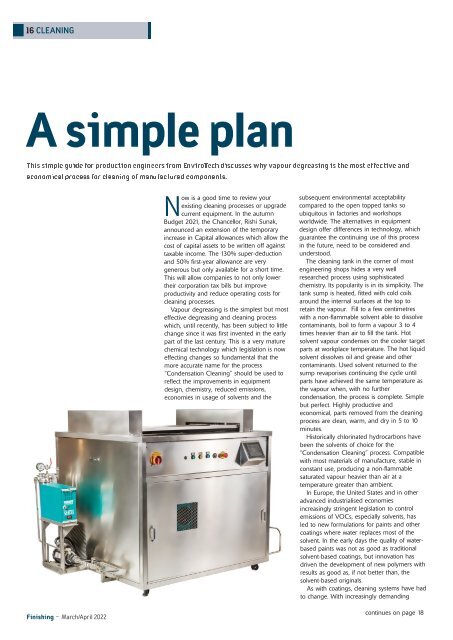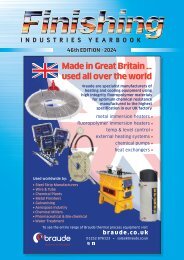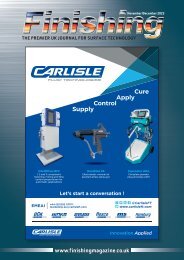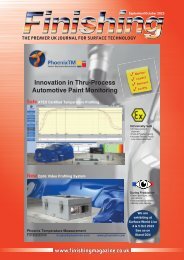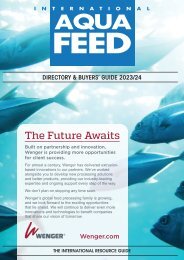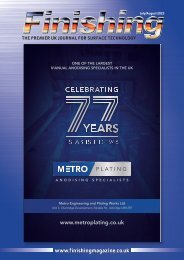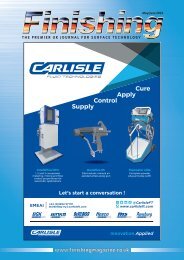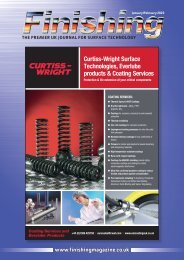Finishing - March-April 2022
Who knew that after coming out of a pandemic, the world could get any worse, but how wrong was everybody. The effects of the war are going to be be huge for industry. Industry that was already under price pressure, but fuel costs now are going to be astronomical. I truly hope that your business survives this latest onslaught. Fair play to all those people volunteering to look after refugees. They have my undying respect and it shows the people of the UK to be a country full of sympathy and humanity. I hope this message is seen from the outside world as I fear that sometimes our leaders may distort how UK citizens really feel. Good luck in the coming months, I think we might need it.
Who knew that after coming out of a pandemic, the world could get any worse, but how wrong was everybody.
The effects of the war are going to be be huge for industry. Industry that was already under price pressure, but fuel costs now are going to be astronomical. I truly hope that your business survives this latest onslaught.
Fair play to all those people volunteering to look after refugees. They have my undying respect and it shows the people of the UK to be a country full of sympathy and humanity. I hope this message is seen from the outside world as I fear that sometimes our leaders may distort how UK citizens really feel.
Good luck in the coming months, I think we might need it.
You also want an ePaper? Increase the reach of your titles
YUMPU automatically turns print PDFs into web optimized ePapers that Google loves.
16 CLEANING<br />
A simple plan<br />
Now is a good time to review your<br />
existing cleaning processes or upgrade<br />
current equipment. In the autumn<br />
Budget 2021, the Chancellor, Rishi Sunak,<br />
announced an extension of the temporary<br />
increase in Capital allowances which allow the<br />
cost of capital assets to be written off against<br />
taxable income. The 130% super-deduction<br />
and 50% first-year allowance are very<br />
generous but only available for a short time.<br />
This will allow companies to not only lower<br />
their corporation tax bills but improve<br />
productivity and reduce operating costs for<br />
cleaning processes.<br />
Vapour degreasing is the simplest but most<br />
effective degreasing and cleaning process<br />
which, until recently, has been subject to little<br />
change since it was first invented in the early<br />
part of the last century. This is a very mature<br />
chemical technology which legislation is now<br />
effecting changes so fundamental that the<br />
more accurate name for the process<br />
“Condensation Cleaning” should be used to<br />
reflect the improvements in equipment<br />
design, chemistry, reduced emissions,<br />
economies in usage of solvents and the<br />
subsequent environmental acceptability<br />
compared to the open topped tanks so<br />
ubiquitous in factories and workshops<br />
worldwide. The alternatives in equipment<br />
design offer differences in technology, which<br />
guarantee the continuing use of this process<br />
in the future, need to be considered and<br />
understood.<br />
The cleaning tank in the corner of most<br />
engineering shops hides a very well<br />
researched process using sophisticated<br />
chemistry. Its popularity is in its simplicity. The<br />
tank sump is heated, fitted with cold coils<br />
around the internal surfaces at the top to<br />
retain the vapour. Fill to a few centimetres<br />
with a non-flammable solvent able to dissolve<br />
contaminants, boil to form a vapour 3 to 4<br />
times heavier than air to fill the tank. Hot<br />
solvent vapour condenses on the cooler target<br />
parts at workplace temperature. The hot liquid<br />
solvent dissolves oil and grease and other<br />
contaminants. Used solvent returned to the<br />
sump revaporises continuing the cycle until<br />
parts have achieved the same temperature as<br />
the vapour when, with no further<br />
condensation, the process is complete. Simple<br />
but perfect. Highly productive and<br />
economical, parts removed from the cleaning<br />
process are clean, warm, and dry in 5 to 10<br />
minutes.<br />
Historically chlorinated hydrocarbons have<br />
been the solvents of choice for the<br />
“Condensation Cleaning” process. Compatible<br />
with most materials of manufacture, stable in<br />
constant use, producing a non-flammable<br />
saturated vapour heavier than air at a<br />
temperature greater than ambient.<br />
In Europe, the United States and in other<br />
advanced industrialised economies<br />
increasingly stringent legislation to control<br />
emissions of VOCs, especially solvents, has<br />
led to new formulations for paints and other<br />
coatings where water replaces most of the<br />
solvent. In the early days the quality of waterbased<br />
paints was not as good as traditional<br />
solvent-based coatings, but innovation has<br />
driven the development of new polymers with<br />
results as good as, if not better than, the<br />
solvent-based originals.<br />
As with coatings, cleaning systems have had<br />
to change. With increasingly demanding<br />
<strong>Finishing</strong> - <strong>March</strong>/<strong>April</strong> <strong>2022</strong><br />
continues on page 18


